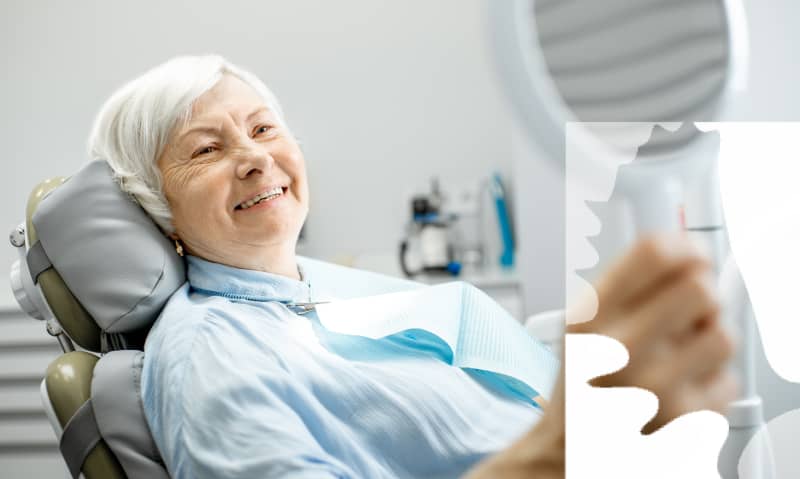6 Important Things to Do When Caring for Dentures or Partial Dentures

Did you know that approximately 15% of the adult and senior populations in the United States have dentures? As we get older, tooth loss becomes more common. Gum disease becomes more prevalent as we age, leading to receding gums, deterioration of the jawbone, and tooth loss. For this reason, dentures are a popular dental treatment for patients who want to restore their smile, fill out the appearance of their face and profile, and eat and speak better than they can without teeth. The key to successful denture treatment, however, all comes down to denture care (well, almost).
What you need to know about denture care.
If you have dentures or are thinking of getting dentures, you should be in the know about denture care. We are often asked how to clean dentures. But thankfully, caring for your dentures isn’t all that difficult, especially if you know what to do to keep them clean, free from stains, and looking their best.
1. Rinse your dentures after meals.
After you have finished your meal:
- Place a towel in the sink so that there is a cushion in the event you drop your dentures.
- Remove your dentures and rinse them with lukewarm tap water to remove any food particles.
- Use a soft-bristled toothbrush to clean your dentures.
A hard-bristled toothbrush can scratch your dentures, causing odor-causing bacteria to build up in the cracks. Also, use lukewarm or cold water when cleaning your dentures. Water that is too hot can warp your dentures.
2. Clean your mouth when you remove your dentures.
While you are removing your dentures after a meal, take a moment or two to clean your mouth too. Use your soft-bristled toothbrush to brush your teeth, and then use a piece of clean gauze to clean your tongue, cheeks, and the palate of your mouth. This will help remove excess bacteria that can build up underneath your dentures.
3. Rinse your dentures with water after using a denture-soaking solution.
Be sure to run your dentures under some tap water after soaking them in a solution. Denture solutions often include ingredients such as citric acid, sodium bicarbonate (baking soda), sodium perborate, potassium monopersulfate, or tetra acetyl ethylene diamine (an antimicrobial), and these solutions are harmful if ingested. We suggest you use an approved denture solution and not toothpaste to clean your dentures.
As an additional note, the best time to soak your dentures is overnight while you are sleeping.
4. Be cautious when handling your dentures.
Handle your dentures with care. Use caution to ensure you do not bend or damage the clasps or plastic when cleaning. As mentioned previously, always place a towel in the sink when you are cleaning your dentures; if you drop them, they may shatter.
5. Don’t try to fix broken dentures.
Broken dentures can rarely be properly fixed at home. If your dentures break, don’t try to fix them yourself. Bring them to your dentist so that they can employ the best process to restore your dentures or get you a new pair.
6. Remove your dentures at bedtime.
We recommend that you remove your dentures when it is time for bed. Leaving your dentures in while you sleep can be harmful to your gum health, causing increased bacteria buildup, gum inflammation, and even bone resorption. It will also be much more comfortable for you to sleep without them in—and you can let them soak in a cleaning solution overnight so they are ready to go the next day.
Partial Denture and Implant-supported Denture Care.
Caring for your partial dentures is very similar to what we outlined above for full denture care. Your partial dentures will need to be brushed daily with a soft-bristled toothbrush. If you use denture adhesive, pay close attention to the grooves that lie over the gums, taking extra care to remove any adhesive material. Also, as has already been noted, be cautious with denture-soaking solutions and ensure you have thoroughly rinsed your partial dentures before returning them to your mouth.
You can clean implant-supported dentures just like regular teeth. Be sure to brush twice a day for two minutes using a soft-bristled toothbrush. Floss between the teeth and at the gum line at least once daily to loosen food particles that have become stuck. And, rinse with a fluoridated mouthwash after flossing to help remove those food particles from your mouth.
We often recommend that our patients with implant-supported dentures use a water flosser to remove food particles and bacterial buildup. Water flossers can help get at those hard-to-reach places much more effectively than manual flossing efforts. Further, many water flossers available on the market today come equipped with small brushes that are perfect for cleaning implant-supported dentures.
Don’t forget to make a trip to Valley Dental Clinic every six months as part of your critical denture care routine.
Like we said earlier, the key to successful denture treatment all comes down to denture care (well, almost). To ensure your denture treatment is truly as successful and effective as we all want it to be, you need to pay a visit to your dentist every six months for a professional dental cleaning and oral examination.
Dr. Robinson and Dr. Lyerly at Valley Dental Clinic in Wasilla, Alaska, can ensure that your dentures stay in tip-top shape and can help you protect your oral health. So if it is time for your next dental visit and you haven’t yet made an appointment, now is the time to contact us. We can’t wait to see you.